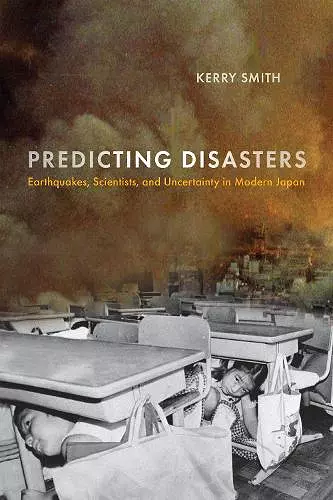Predicting Disasters
Earthquakes, Scientists, and Uncertainty in Modern Japan
Format:Hardback
Publisher:University of Pennsylvania Press
Published:27th Feb '24
Currently unavailable, and unfortunately no date known when it will be back

Japan is a place where powerful earthquakes have occurred more frequently and have caused more harm in the modern era than they have in all but a handful of other locations on the planet. In the twentieth century alone, earthquake disasters in Japan took almost as many lives as they had in all of the country's recorded history up to that point. Predicting Disasters is the first English-language book to explore how scientists convinced policy makers and the public in postwar Japan that catastrophic earthquakes were coming, and the first to show why earthquake prediction has played such a central role in Japan's efforts to prepare for a dangerous future ever since.
Kerry Smith shows how, in the twentieth century, scientists struggled to make large-scale earthquake disasters legible to the public and to policy makers as significant threats to Japan's future and as phenomena that could be anticipated and prepared for. Smith also explains why understanding those struggles matters. Disasters, Smith contends, belong alongside more familiar topics of analysis in modern Japanese history—such as economic growth and its impacts, political crises and popular protest, and even the legacies of the war—for the work they do in helping us better understand how the past has influenced beliefs about Japan's possible futures, and how beliefs about the future shape the present.
Predicting Disasters makes relevant elements of Japan's past more accessible to readers interested in the histories of disaster and scientific communities, as well as to those who want to gain a better understanding of the risk and uncertainty surrounding natural phenomena.
"This book argues persuasively that disaster as a process is endemic to modern Japan, that it is something that has framed the course of Japan's recent history. Based on an enormous amount of research in a wide range of sources—including the popular press, scientific treatises, personal papers and interviews with individuals—this volume successfully exposes the social experience of, and society's response to, the persistent presence of potential and actual earthquake disasters in Japan over its recent history. It is an extremely well-written, in-depth study accessible to a wide readership...It fully deserves the widest possible readership and will be a yardstick in this area of study for some time to come." (History: Reviews of New Books) "Smith makes a valuable contribution to the literature that illuminates how countries facing similar hazards with access to the same technology and knowledge can nonetheless find themselves managing disasters in radically different ways. The story of earthquake predication in Japan offers a reminder that the practice of emergency management and disaster risk reduction is inseparable from questions of culture and history, and that effectively protecting communities from disaster will never simply be a matter of copying 'best practice' from somewhere else." (Australian Outlook) "An authoritative study that documents far more than Japan's chimerical quest to master earthquake prediction. Kerry Smith beautifully illustrates how seismic vulnerability and risk, science and speculation, personal ambition and politics, anticipation and fear, have all shaped Japan's modern approach to earthquakes and thus the nation we know today. Innovative, imaginative, and provocative, Predicting Disasters is a thoroughly compelling read." (J. Charles Schencking, author of The Great Kantō Earthquake and the Chimera of National Reconstruction in Japan) "Kerry Smith masterfully narrates the ways in which Japanese seismologists' promise of earthquake prediction have played out against the geological reality and socioeconomic conditions of Japan since the late nineteenth century. Predicting Disasters is not only an excellent history of Japanese seismology but also a vivid testimony to the fact that paradigm shifts in science can be a gradual and arduous process." (Yoshikuni Igarashi, author of Japan, 1972: Visions of Masculinity in an Age of Mass Consumerism)
ISBN: 9781512825374
Dimensions: unknown
Weight: unknown
368 pages